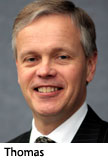The Specific Ministry Pastor (SMP) Program Committee has published foundational documents for the program, paving the way for SMP students to begin their studies as early as this fall.
The committee has been meeting to design the details of the new pastoral-education program in response to Resolution 5-01B, “To Establish Specific Ministry Pastor Program,” adopted by LCMS convention delegates last summer.
The SMP documents may be viewed and downloaded on the Web sites of the Synod’s Board for Pastoral Education (www.lcms.org/pastoraleducation); Concordia Seminary, St. Louis (www.csl.edu); and Concordia Theological Seminary, Fort Wayne (www.ctsfw.edu). Or, click here.
Rev. Glen Thomas, executive director of the Board for Pastoral Education and chair of the SMP Committee, said the new program is different from anything t he Synod and its seminaries have done in the past.
he Synod and its seminaries have done in the past.
“The church in convention not only established a new category of clergy, the ‘specific ministry pastor,’ but also approved a very innovative way of forming this pastor for service while he remains in his ministry context,” he said.
A prospective SMP student does not initiate the application process himself, Thomas noted, but leaders at a site that has a pastoral ministry need — together with the LCMS district in which that need exists — nominate the candidate for admission. The candidate is expected to serve at that site throughout the duration of his SMP formation program and beyond its completion.
“It is important to remember that this program is mission-driven and mission-focused,” said Dr. Andrew Bartelt, professor and executive vice president of Concordia Seminary, St. Louis, and a member of the SMP Committee. “Instead of receiving a candidate from the seminary, the seminary receives a student from the field and in the field, raised up from within the ministry setting. He is already in place to serve while he connects to the pastoral formation provided by the church.”
SMP students serve as vicars during the first two years of the program, which includes eight seminary courses. The courses are completed via distance education under the supervision of a pastor who meets with the student at least three to five hours each week.
Since each student will serve as a vicar upon entering the program, “he is required to demonstrate entry-level competence in seven critical areas before he enrolls in courses or begins vicarage responsibilities,” according to Dr. Lawrence Rast, professor and academic dean of Concordia Theological Seminary, Fort Wayne, and an SMP Committee member. “We believe this requirement is appropriate and that it will not be an obstacle for those who desire to serve as specific ministry pastors,” Rast said.
After completing the two-year vicarage and eight courses, the student is eligible to receive a call to serve as a specific ministry pastor at his vicarage site.
Once ordained, he completes eight additional seminary courses over the next two years and remains under pastoral supervision before he completes the program. The district president then assigns a pastor to provide ongoing oversight of the SMP graduate. The district president also is responsible for the roster status and mobility of the specific ministry pastor.
“I am very encouraged by the design of the SMP program and by the reaction the program received from the LCMS Council of Presidents,” commented Dr. Warren Schumacher, president of the Synod’s Northwest District and a member of the SMP Committee. “There has been a wonderful spirit of cooperation between our seminaries and districts in its development, and we look forward to continued partnership in the raising-up and equipping of specific ministry pastors.”
For more information about the SMP program, contact your district office. To see contact information for LCMS districts, go to www.lcmsdistricts.org.
Posted March 6, 2008



